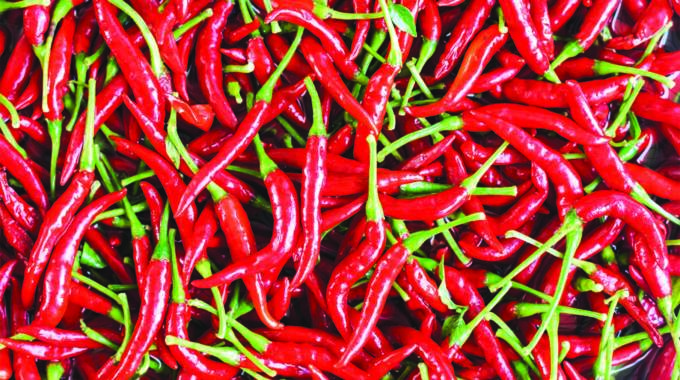
The Sunday Mail

Golden Sibanda
IN a development expected to uplift smallholder farmers across Zimbabwe and drive horticultural exports, a leading Thailand-based supplier of chilli paste, De Smit Food International, has inked an agreement with Zimbabwean firm Shumbatafari to contract farmers to produce chillies under a scalable multi-million-dollar deal.
The agreement will drive the production of chillies in Zimbabwe for export across the world and also see significant investment in building factory capacity for semi-processed chilli paste before its shipment to Thailand.
The dry chillies market size is estimated at US$1,61 billion in 2024, and is expected to reach US$42,6 billion by 2029, growing at a compounded annual growth rate (CAGR) of 6,11 percent during the forecast period (2024-2029).
Similarly, the global chilli sauce market is poised to grow significantly, from US$1,912 billion in 2022, expanding at a CAGR of 5,71 percent during the forecast period, reaching US$2,67 billion by 2028.
Zimbabwe’s chilli exports remain negligible though, running into a few hundred thousand US dollars per annum, but the country possesses huge potential to produce huge quantities that can fetch several millions of dollars in forex.
Currently, Zimbabwe’s chilli shipments are mostly to South Africa, the Netherlands and the United States. The three largest exporters of chillies globally are India, followed by China.
Chillies can become an integral element of Zimbabwe’s export-led growth strategy and given the crop’s simple cultivation and climate versatility, it can be a lucrative source of income for smallholder farmers, who make up nearly three quarters of farmers in Zimbabwe.
Shumbatafari managing director Mr Valentine Tapfumaneyi said they invited Smit Food to Zimbabwe to thrash out the modalities for the production of chillies and its conversion into a semi-processed state before its exportation.
“We have invited Smit Food to partner and set up a special-purpose vehicle (SPV) to produce chillies, at the same time supporting smallholder farmers, as well as working with parastatals to produce a sizeable amount of chilli,” he said.
The Zimbabwean company was established in 2014, doing various crops, but started production of chillies in 2019 for the “volumes market”, a first in Zimbabwe. The arrangement with De Smitfood will cut the middleman and increase the margins for the outgrowers.
“Our initial projected target would be to do like 20 000 tonnes of fresh chillies, but we have to start somewhere. That translates to several thousands of hectares of chillies. Indirectly, this has an impact on over 5 000 families; we do small-scale, as well as commercial,” he said.
Smit Food director Mr Erwin De Smit said he was ready to roll out the outgrower chillies production scheme in Zimbabwe, to be complemented with investment into the establishment of a semi-processed chillies plant in the country.
“I was surprised by the way systems are set up here in Zimbabwe, especially on the farms, very professional, and it will make our life as an investor and company much easier.
“We are very happy to announce that we will start our business here very soon,” Mr De Smit said, adding he was convinced Shumbatafari will drive the company’s agenda to expand its source markets for chilli paste raw materials.
He spoke glowingly of the highly organised farming system in Zimbabwe, which he described as “plug and play”.
“We have the market in our hands, we already do agricultural production in several countries: Thailand, Vietnam, China.
“We are very happy to start in Africa, here in Zimbabwe. Of course, we have to spread our risk. Everybody knows there is climate change; there are some weather issues which, as an exporter, we have to make sure we can have enough raw materials.
“By setting up a professional contract farming system here in Zimbabwe, we will be able to not disappoint our customers; we will always be able to supply and also the market forecast of 10 percent growth every year, so we need more and more raw materials,” he said.
Smit Food currently exports to the United States, Europe, China and across Asia.
After signing the agreement with Shumbatafari, Mr De Smit said they had already set up a company (SPV) and started the process of establishing a large warehouse.
“We will export dried chillies, but will invest in the production of fresh ones.
‘‘We will be able to grow and process chilli paste. We are talking about 20 000 tonnes, 30 000 tonnes or even 50 000 tonnes of chillies per annum, which will create a huge amount of jobs here in Zimbabwe,” Mr De Smit said.
He said it was Shumbatafari, through Mr Tapfumaneyi, that explained to them about the opportunities and professional systems in the country, which motivated Smit Food to consider investing in Zimbabwe ahead of other countries.
According to ZimTrade, the growing global demand for spices, coupled with dwindling supply from traditional source markets, presents an opportunity for local producers to increase exports of chilli to the world market.
Zimbabwe has a horticulture recovery and growth plan whose main target is to increase horticultural exports to US$300 million by 2030.
The Southern African country currently earns US$120 million annually from exports of horticultural products, including citrus fruits, flowers, tea, avocados, blueberries and macadamia nuts, according to the Horticultural Development Council.



